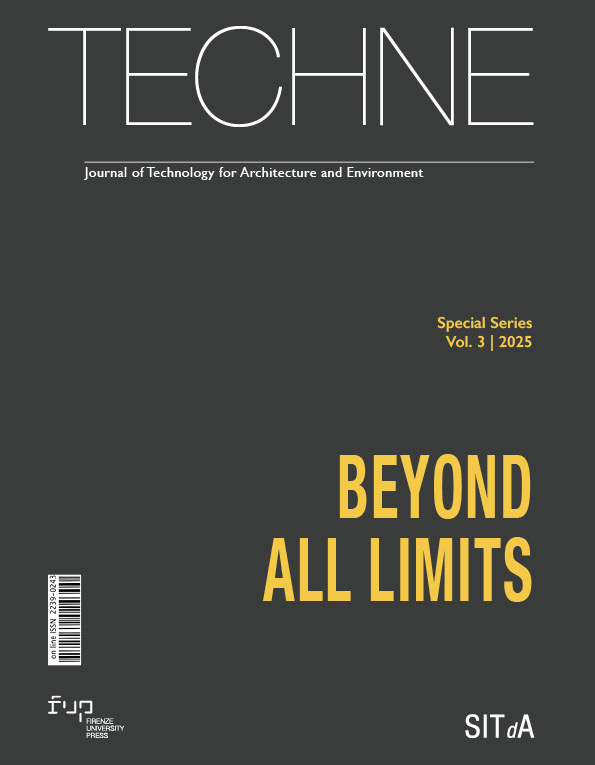Published 2025-07-31
Keywords
- Life Centered Design,
- Posthuman Design,
- MMore-than-human Design,
- Ecosystemic Design,
- Non-human agency
How to Cite
Copyright (c) 2025 Niccolò Casiddu, Claudia Porfirione, Francesco Burlando, Annapaola Vacanti, Isabella Nevoso

This work is licensed under a Creative Commons Attribution 4.0 International License.
Abstract
This paper explores Life-Centred Design (LCD), an emerging concept aiming to overcome anthropocentric approaches by addressingall forms of life in the design process. Through a bottom-up analysis of case studies, it identifies the distinctive traits of LCD compared to other post-human approaches. The findings highlight the strong integration of foundational LCD principles, such as sustainability and systemic thinking, while revealing challenges in implementing co-design practices, non-human agency, and prioritising non-human interests. Addressing these complexities is essential for advancing LCD into a practical framework capable of tackling Anthropocene challenges.
Downloads
References
- BLANK UNTIL FINAL ACCEPTANCE (2024), Life-centered case study analysis [Data set], Zenodo, available at: https://doi.org/10.5281/zenodo.14308302.
- Borthwick, M., Tomitsch, M. and Gaughwin, M. (2022), “From human-centred to life-centred design: Considering environmental and ethical concerns in the design of interactive products”, Journal of Responsible Technology, Vol. 10, 100032, available at: https://doi.org/10.1016/j.jrt.2022.100032 DOI: https://doi.org/10.1016/j.jrt.2022.100032
- Burlando, F. and Nevoso, I. (2022), “(Metodi HCD x Approcci More-than-human) = Design Inclusivo^3”, DAI | Il Disegno per l’Accessibilità e l’Inclusione, pp. 252–265, available at: https://www.publicapress.it/wp-content/uploads/2022/11/DAI_PUBLICA.pdf (accessed 3 April 2025).
- Coulton, P. and Lindley, J. G. (2019), “More-Than Human Centred Design: Considering Other Things”, The Design Journal, Vol. 22(4), pp.463-48, available at: https://doi.org/10.1080/14606925.2019.1614320. DOI: https://doi.org/10.1080/14606925.2019.1614320
- DiSalvo, C., Sengers, P. and Brynjarsdóttir, H. (2010), “Mapping the landscape of sustainable HCI”, Proceedings of the SIGCHI Conference on Human Factors in Computing Systems, 1975-1984, available at: https://doi.org/10.1145/1753326.1753625. DOI: https://doi.org/10.1145/1753326.1753625
- Foth, M., Mann, M., Bedford, L., Fieuw, W. and Walters, R. (2021), “A capitalocentric review of technology for sustainable development: The case for more-than-human design”, in Finlay, A. (Ed.), Global Information Society Watch 2020: Technology, the environment and a sustainable world: Responses from the global South, Association for Progressive Communications (APC), pp. 78-82, available at: https://eprints.qut.edu.au/203186/.
- Harari, Y. N. (2018), 21 lessons for the 21st century (First edition), Spiegel & Grau, New York, US.
- Haraway, D. (2016), Staying with the trouble: Making kin in the Chthulucene. Duke University Press. DOI: https://doi.org/10.2307/j.ctv11cw25q
- Kuhn, T. S. (2009), La struttura delle rivoluzioni scientifiche. Einaudi.
- Lau, A. (2004), “Life Centered Design – A Paradigm for Engineering In The 21st Century”, Proceedings of the 2004 American Society for Engineering Education Annual Conference & Exposition, pp. 9099-9108, available at: https://peer.asee.org/13851.pdf.
- LifeCenteredDesign.Net. (2021), LifeCenteredDesign.Net, available at: https://lifecentereddesign.net (accessed 3 April 2025).
- Lovelock, J. (2020), Novacene l’età dell’iperintelligenza, Bollati Boringhieri, Torino, Italy.
- Lutz, D. (2023), The Non-Human Persona Guide: How to create and use personas for nature and invisible humans to respect their needs during design (Life-centred Design Guides). Damien Lutz.
- Lutz, D. (2024), What is life-centred design?, Medium, available at: https://uxdesign.cc/life-centred-design-96965acdcbf4 (accessed 3 April 2025).
- Monteiro, M. (2019), Ruined by design: How designers destroyed the world, and what we can do to fix it, Mule Design, San Francisco, California.
- Norman, D. A. (2019), La caffettiera del masochista: Il design degli oggetti quotidiani, Giunti Psychometrics S.r.l., Florence, Italy
- Paoliello, C., Li, B. and Metzdorf, E. (2025), Toward a Nature-Centered Design. diid, Vol. 1(83), available at: https://doi.org/10.30682/diid8324h DOI: https://doi.org/10.30682/diid8324h
- Papanek, V. (1972), Design for the real world, Thames & Hudson, London, UK.
- Pozzi, F. (2022), Digital Nudge, Ledizioni, Milano, Italy.
- Tassinari, V., Manzini, E. and De Rosa, A. (2021), The Politics of Nature. Introducing re-worlding. DESIS Philosophy Talk# 7.5. Proceedings of the 9th Nordic Design Research Conference, Vol. 9, pp. 473-477, available at: https://doi.org/10.21606/nordes.2021.53. DOI: https://doi.org/10.21606/nordes.2021.53
- Vacanti, A., Burlando, F., Nevoso, I. and Menichinelli, M. (2024), “The More-Than-Human Trend in Design Research: A Literature Review”, Diid Disegno Industriale Industrial Design, DSI 1, pp. 80-89, available at: https://doi.org/10.30682/diiddsi23t1s. DOI: https://doi.org/10.30682/diiddsi23t1s






